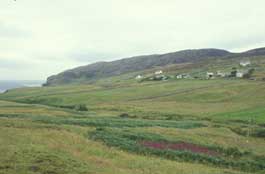| Farm Buildings and Agricultural Settlement |
|
|
|
 |
Crofting
township, Kirtomy, Farr, Sutherland |
The crofting townships, so characteristic of the north-west Highlands and Islands, are a relatively recent creation, dating only from the 19th century. Typically, they have a regular layout, with croft house and outbuildings linked to a small plot of arable land and with the use of extensive communual grazings.
The initial impetus came with evictions from older settlements. The growth of the wool textile industry in the late 18th and early 19th centuries led to lands being turned over to sheep farming.
The new crofting settlements, which saved some families from emigration, were created to house workers who gathered kelp – a kind of seaweed – which was burnt to extract a raw material for the chemical industry. After 1886, they achieved some security of tenure under the Crofters' Holdings (Scotland) Act. |

Resource pack
|
 |
|
|





